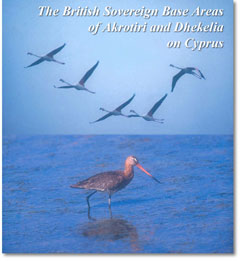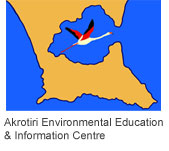 |
The British Sovereign Base Areas of Akrotiri and Dhekelia
in Cyprus
The British Sovereign Base Areas of Akrotiri and Dhekelia comprise those parts of Cyprus which stayed under British jurisdiction and remained British sovereign territory when the 1960 Treaty of Establishment created the independent Republic of Cyprus.
 They cover 98 square miles, 47.5 around Akrotiri, the Western Sovereign Base Area (WSBA) and 50.5 around Dhekelia, the Eastern Sovereign Base Area (ESBA). Because they are run as military bases, the Sovereign Base Area Administration (SBAA) reports to the British Ministry of Defence in London rather than the Foreign and Commonwealth Office. Nevertheless they are a British Overseas Territory with a civilian administration working under an Administrator who is Commander, British Forces Cyprus. The Chief Officer, Administrative Secretary, Resident Judge, Chief Constable and other senior officials are recruited from or seconded from UK departments. The administration of the Bases is driven by three main policy objectives: effective use as a military base; full co-operation with the Republic of Cyprus; and protection of those resident or working in the Bases.
They cover 98 square miles, 47.5 around Akrotiri, the Western Sovereign Base Area (WSBA) and 50.5 around Dhekelia, the Eastern Sovereign Base Area (ESBA). Because they are run as military bases, the Sovereign Base Area Administration (SBAA) reports to the British Ministry of Defence in London rather than the Foreign and Commonwealth Office. Nevertheless they are a British Overseas Territory with a civilian administration working under an Administrator who is Commander, British Forces Cyprus. The Chief Officer, Administrative Secretary, Resident Judge, Chief Constable and other senior officials are recruited from or seconded from UK departments. The administration of the Bases is driven by three main policy objectives: effective use as a military base; full co-operation with the Republic of Cyprus; and protection of those resident or working in the Bases.
 The SBAA is responsible for protection of the environment in the bases and works closely with the relevant Cypriot Republic departments. A joint exercise protects breeding loggerhead and green turtles on the beaches within the WSBA. The only remaining colony of griffon vultures on Cyprus is on the cliffs at Episkopi in the WSBA, and there is a large colony of Eleanora’s falcons both here and on the cliffs bordering the Royal Air Force station at Akrotiri. The most important wetland on the island of Cyprus, Akrotiri salt lake, lies within the WSBA and is a Ramsar wetland site of international importance. The SBAA is responsible for protection of the environment in the bases and works closely with the relevant Cypriot Republic departments. A joint exercise protects breeding loggerhead and green turtles on the beaches within the WSBA. The only remaining colony of griffon vultures on Cyprus is on the cliffs at Episkopi in the WSBA, and there is a large colony of Eleanora’s falcons both here and on the cliffs bordering the Royal Air Force station at Akrotiri. The most important wetland on the island of Cyprus, Akrotiri salt lake, lies within the WSBA and is a Ramsar wetland site of international importance.
The Akrotiri Environment Education and Information Centre was established in 2004 to promote the significance and uniqueness of the Akrotiri Peninsula through educational programmes and exhibits. The centre offers environmental education programmes to school groups from all over Cyprus and welcomes over 10,000 visitors per year.
 Two major problems need to be faced by the SBAA: shooting in both the ESBA and WSBA, particularly around Akrotiri salt lake, and netting and trapping of small migrant song-birds on migration in the ESBA in spring and autumn. These practices are illegal in both the Republic of Cyprus and the SBAs (whose laws mirror those of the Republic). These tiny birds of about 16 species are cooked and sold as a delicacy in Cypriot restaurants and exported to Cypriot communities overseas. An estimated 8 million European songbirds are killed each year. Two major problems need to be faced by the SBAA: shooting in both the ESBA and WSBA, particularly around Akrotiri salt lake, and netting and trapping of small migrant song-birds on migration in the ESBA in spring and autumn. These practices are illegal in both the Republic of Cyprus and the SBAs (whose laws mirror those of the Republic). These tiny birds of about 16 species are cooked and sold as a delicacy in Cypriot restaurants and exported to Cypriot communities overseas. An estimated 8 million European songbirds are killed each year.
Formed in 2003, BirdLife Cyprus is a non-governmental, non-profit, registered organization (NGO) that works to conserve wild birds, their habitats and wider biodiversity in Cyprus, through research, monitoring, lobbying and conservation and awareness-raising actions.
about Virtual Tours...
|
 |
 |
| click images for larger versions |
| Akrotiri salt lake provides a wintering area for up to 30,000 Greater Flamingos (pictured) and is an important staging area for cranes, migrant waders (black-tailed godwit, pictured) and birds of prey, in particular. Rare endemic orchids (pictured and various reptiles and amphibians (green tree frog, pictured) are also found within the Bases, as well as many migrant songbirds (blackcap, pictured). |
| Photographs courtesy of Michael Gore FRPS |
|
| |
 |
 |
|
















